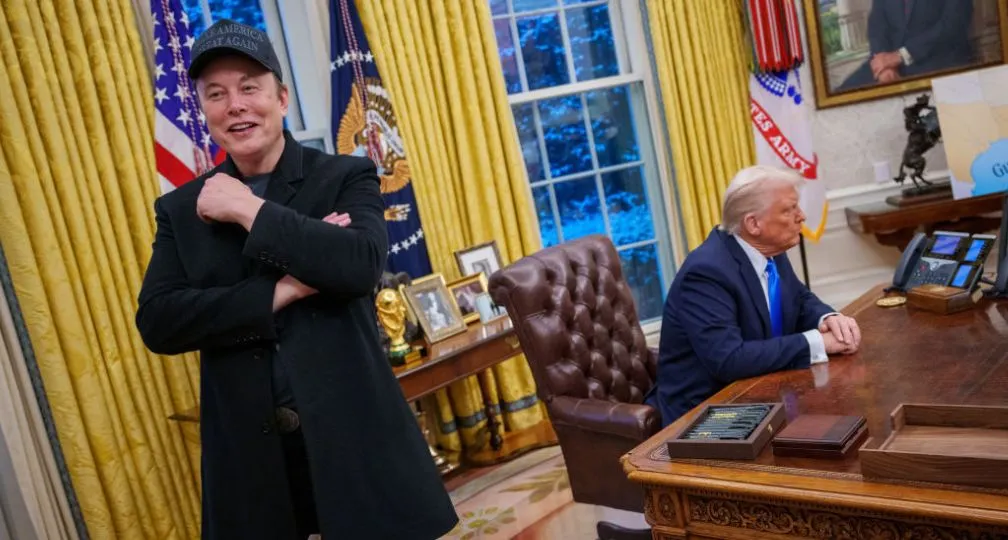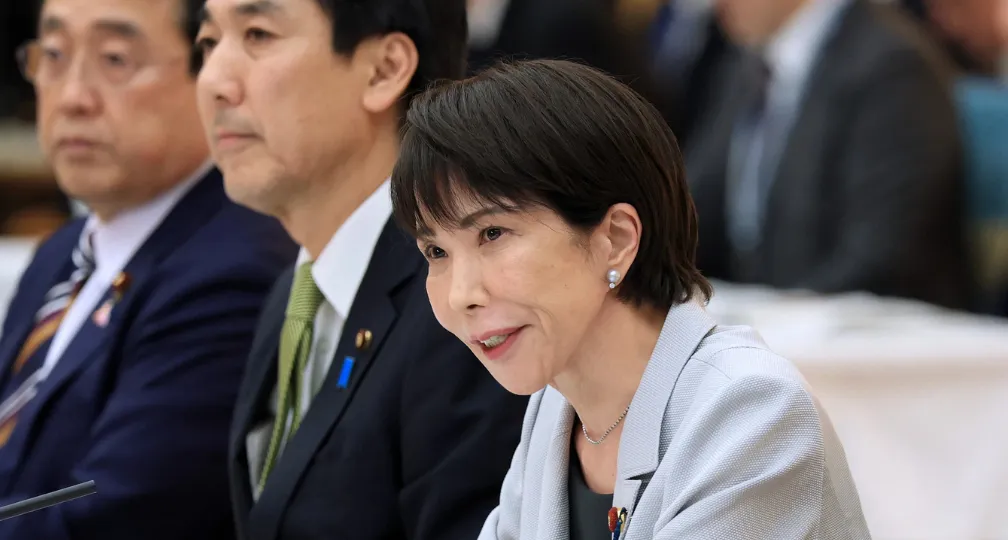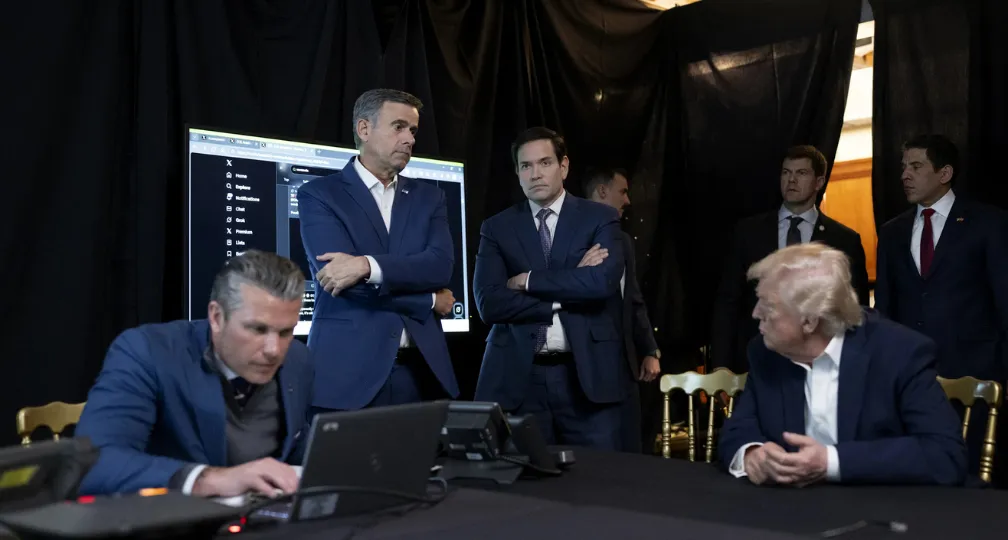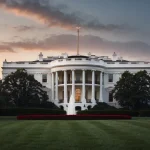DOGE Shock and Crisis in U.S. Credibility

Since January 2025, DOGE has taken on an entirely different meaning, a newly created federal entity under the second Trump administration. DOGE is dismantling key functions of the U.S. federal government. The U.S. Agency for International Development (USAID) has seen 83% of its programs shut down, with remaining programs to be run under the State Department.
One climate change negotiator of a G7 nation laments, “My counterparts at the State Department just disappeared—along with their entire office.”
President Trump praised Musk’s efforts in his address to Congress in March, citing nearly 20 examples of what he labeled “federal waste” uncovered by DOGE. According to Trump’s speech, one of the goals he is pursuing through DOGE is to balance the federal budget—a feat not achieved in 24 years.
Trump’s obsession with flow over stock
In fiscal year 2024, the U.S. federal budget recorded revenues of approximately $5 trillion against expenditures of $7 trillion, resulting in a $2 trillion deficit.
Historically, the U.S. has routinely financed such deficits through Treasury-issued bonds, relying on the dollar’s global dominance and perceived invulnerability to default—reflecting the unrivaled USD’s currency hegemony and the position as global reserve currency, the U.S. has maintained for nearly eight decades.
The U.S. government has maintained federal finances through public debt management and monetary policy while factoring in budget deficits. In short, the U.S. government has been managing the nation with an emphasis on stocks (assets and bonds), alongside budgetary flow (revenue and expenditures) of the nation’s finances.
Trump, however, views deficits as inherently problematic, obsessively prioritizing flow over stock. His aggressive measures—whether slashing government expenditures through DOGE or attempting to reduce trade deficits through tariffs—reflect this fixation.
Ironically, what enables Trump’s radical flow-oriented mindset is the considerable stock of U.S. credibility and dollar hegemony, painstakingly built since the end of World War II.
The Argentina precedent
Unlike the U.S., in most countries, reckless government spending can trigger inflation and sovereign defaults—exemplified historically by Argentina. Argentina experienced nine defaults from 1827 until 2020.
In 2023, Javier Millay entered the presidential race with a platform of radical fiscal reform. That year, Argentina faced inflation surpassing 130% and a GDP contraction of 1.6%. During the election campaign, he wielded a chainsaw, symbolically promising drastic fiscal reform. Upon assuming office in December 2023, President Millay swiftly enacted reforms: reducing the number of ministries, slashing civil service jobs by 10%, abolishing fuel subsidies, and cutting overall government spending, including social security, by 30 percent.
Central to Milei’s “chainsaw” reforms is the Ministry of Deregulation and State Transformation, initially intended as a temporary entity but later extended its mandate. Milei’s bold approach—mass layoffs, radical downsizing, and a temporary organization—became a direct model for DOGE. Elon Musk has met with Milei a few times since last April, praising Milei’s austerity measures. President Milei became the first head of state Trump met following his November presidential election.
Yet, the chainsaw-style governance reform in Argentina—a nation burdened by currency instability, repeated defaults, rampant inflation, and a poverty rate in the 40% range—is profoundly unsuitable for the U.S. The nation has maintained dollar hegemony and provided international public goods. Extreme governmental downsizing risks severe and far-reaching damage, undermining America’s national interests and destabilizing the international order.
This is why allies of the U.S. are concerned about the DOGE reform.
Japan is not the exception.
Japan’s administrative reform
In the 1980s, Japan wielded an administrative reform axe through the Ad Hoc Commission on Administrative Reform, established by Prime Minister Zenko Suzuki amidst spiraling national debt following the 1970s oil shocks. The commission was led by a successful businessman and the former president of the Japan Business Federation (Keidanren) Toshio Doko.
Chairman Doko aimed for fiscal reconstruction without raising taxes, following President Reagan’s efforts to streamline government administration in pursuit of a small government.
The Doko Commission proposed bold measures, notably privatizing Japan National Railways (JNR). JNR was heavily regulated by the Japanese government regarding fares, personnel, and investment plans, and lacked management flexibility, so it could not operate without government subsidies. After the privatization, Central Japan Railway Company continued to invest heavily in Shinkansen, the world’s first high-speed rail. The bullet train has become a global symbol of Japanese credibility, thanks to its unparalleled safety, comfort, and accuracy of timetables. This case resembles a good practice of how administrative reform has reduced fiscal spending and increased confidence in the nation by harnessing the power of the private sector.
During the reform, Chairman Doko was known for his frugal life. His motto was: ” Frugal individuals, prosperous society”
Crisis in U.S. Credibility
In stark contrast, DOGE’s approach represents a reversal of Doko’s maxim—society is becoming more frugal, while Trump and his selected elites are getting richer.
DOGE has compromised key governmental functions that have been a source of credibility and strength for the U.S. The dismantling of vital agencies like USAID severely damages U.S. credibility among Global South, creating a leadership vacuum and geoeconomic enclaves, which can be filled by China.
Meanwhile, Elon Musk is returning to private entrepreneurship, where he regained the top spot on the Forbes World’s Billionaires List.
Furthermore, Mr. Trump and first lady Melania Trump launched their crypto assets, the $TRUMP and $MELANIA memecoins, mirroring Dogecoin’s speculative origins.
While the value of their memecoins plummeted significantly, World Liberty Financial, the cryptocurrency company started by Mr. Trump and his sons, plans to issue a stablecoin called “USD1.” The stablecoin is a type of cryptocurrency designed to be pegged to one dollar. President Trump has banned the issuance of Central Bank Digital Currency (CBDC) by the FRB. If USD1 were to circulate globally, Trump risks undermining the Fed’s monetary authority, eroding the dollar’s hegemon and undercutting its reserve currency regime.
Having relinquished its role as the world’s policeman, the U.S. now faces the peril of abandoning its position as the world’s banker.
U.S. global prestige rested on military, economic, and technological superiority, underpinned by unshakable credibility and generosity for allies and like-minded countries. Trump’s policies risk squandering America’s accumulated stock of trust, inflaming global uncertainties, and destabilizing the international order.
Ultimately, the Trump administration’s demolition project imperils not merely domestic stability but the very foundations of global governance itself.
(Photo Credit: Reuters/Aflo)

Geoeconomic Briefing
Geoeconomic Briefing is a series featuring researchers at the IOG focused on Japan’s challenges in that field. It also provides analyses of the state of the world and trade risks, as well as technological and industrial structures (Editor-in-chief: Dr. Kazuto Suzuki, Director, Institute of Geoeconomics (IOG); Professor, The University of Tokyo).
Disclaimer: The opinions expressed in Geoeconomic Briefing do not necessarily reflect those of the International House of Japan, Asia Pacific Initiative (API), the Institute of Geoeconomics (IOG) or any other organizations to which the author belongs.


Senior Research Fellow
Yoshiyuki Sagara is a senior research fellow at the Asia Pacific Initiative (API), where he focuses on economic security, sanctions, health security policy including COVID-19 response, international conflicts, and Japan’s foreign policy. Before joining API in 2020, Mr. Sagara had 15 years of career experience working in the United Nations system and the Japanese government, as well as in the tech industry. From 2018 to 2020, he served as Assistant Director of the Second Northeast Asia Division (North Korea desk) at the Ministry of Foreign Affairs of Japan. From 2015 to 2018, he served in the Guidance and Learning Unit within the Policy and Mediation Division of the UN Department of Political Affairs in New York, where he analyzed and disseminated best practices and lessons learned from UN preventive diplomacy and political engagements, such as in Nigeria, Iraq, and Afghanistan. From 2013 to 2015, he served in the International Organization for Migration Sudan, based in Khartoum. As a project development and reporting officer in the Chief of Mission’s Office, he developed and implemented peacebuilding and social cohesion projects in conflict-affected areas of Sudan, especially Darfur. While serving in the Japan International Cooperation Agency (JICA) Headquarters from 2012 to 2013, he managed rural and fishery development projects in Latin America and the Caribbean region. From 2005 to 2011, he worked at DeNA Co., Ltd. in Tokyo and engaged in expanding tech businesses. Mr. Sagara has been widely published and spoke on public policy, including in the Japan Times. He coauthored a report, The Independent Investigation Commission on the Japanese Government’s Response to COVID-19 (API/ICJC): Report on Best Practices and Lessons Learned (Discover 21, 2021). He holds a Master of Public Policy from the Graduate School of Public Policy at the University of Tokyo, and a BA in law from Keio University.
View Profile-
 Takaichi’s Twin Challenges: Economic Growth and Security2026.01.13
Takaichi’s Twin Challenges: Economic Growth and Security2026.01.13 -
 It’s Now or Never: India’s Ambitious Reform Push2026.01.09
It’s Now or Never: India’s Ambitious Reform Push2026.01.09 -
 Oil, Debt, and Dollars: The Geoeconomics of Venezuela2026.01.07
Oil, Debt, and Dollars: The Geoeconomics of Venezuela2026.01.07 -
 Analysis: Ready for a (Tariff) Refund?2025.12.24
Analysis: Ready for a (Tariff) Refund?2025.12.24 -
 China, Rare Earths and ‘Weaponized Interdependence’2025.12.23
China, Rare Earths and ‘Weaponized Interdependence’2025.12.23
 Oil, Debt, and Dollars: The Geoeconomics of Venezuela2026.01.07
Oil, Debt, and Dollars: The Geoeconomics of Venezuela2026.01.07 The “Economic Security is National Security” Strategy2025.12.09
The “Economic Security is National Security” Strategy2025.12.09 It’s Now or Never: India’s Ambitious Reform Push2026.01.09
It’s Now or Never: India’s Ambitious Reform Push2026.01.09 Analysis: Ready for a (Tariff) Refund?2025.12.24
Analysis: Ready for a (Tariff) Refund?2025.12.24 Navigating Uncertainty in U.S. Space Policy: Decoding Elon Musk’s Influence2025.04.09
Navigating Uncertainty in U.S. Space Policy: Decoding Elon Musk’s Influence2025.04.09











